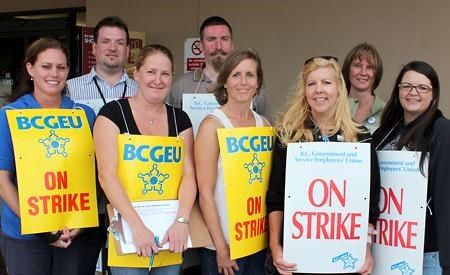Powell River government workers, including liquor store clerks, child protection workers and justice ministry staff, walked the picket line Wednesday, September 5 to draw attention to frozen wages and stalled contract talks.
They were part of 25,000 unionized employees who staged a one-day strike across the province. Essential services in the courts, prisons, child protection and forest fire service were not affected.
Ken Hodson, shop steward and picket captain at the Powell River government liquor store, said workers currently don’t have a contract. “Government isn’t at the table,” he said. “We’re asking for cost of living, after taking zeros for a number of years.”
The BC Government Employees Union (BCGEU) is asking for a 3.5 per cent wage increase this year and a cost-of-living increase next year. The union has rejected the provincial government’s offer of a two per cent increase the first year and a 1.5 per cent increase the second year, an offer the government has now taken off the table. Bargaining talks remain stalled.
BCGEU is also trying to raise public awareness about the selling of the liquor distribution branch that the government announced in its budget last year, Hodson said. “They’re planning on having the sale go through right before the next election,” he said. “We’re trying to gain public interest in knowing that this is a big money maker for the province. It’s our tax dollars and the government wants to sell it to corporate interests.”
Hodson pointed out that Kevin Falcon, former BC finance minister who recently resigned, will be receiving 15 months severance pay and an annual pension of almost $63,000. “A bunch of Liberals have jumped shipped,” he said. “The money there could easily pay for any kind of cost-of-living raises that are needed.”
As well, Hodson said, the BCGEU has given the government ideas about how to increase revenues, including opening on Sundays and later hours. “It would never cost taxpayers one dollar,” he said. “We would generate even more tax dollars.”
In 2009, the BC government imposed a net-zero mandate on unions that represent government workers, meaning that wages would not be raised for two years. The government is now negotiating “modest wage increases made possible by productivity increases within existing budgets,” according to the ministry of finance website.



